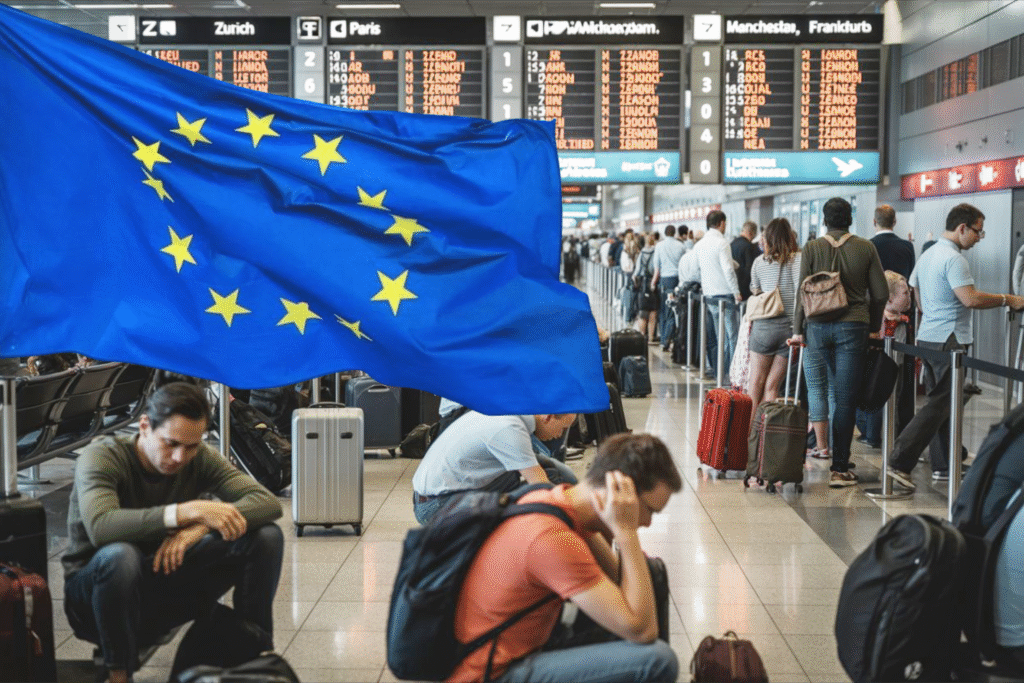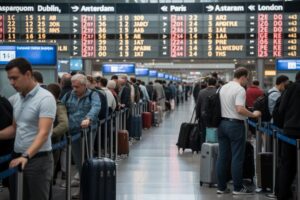Flight Disruptions Across Europe Grounded Thousands of Passengers: Families Stranded, Airports Buckled Under Pressure

Thousands of passengers across Europe were left stranded on Friday as major carriers including British Airways, Air France, Lufthansa, KLM, Swiss, Brussels Airlines and others, grappled with more than 65 flight cancellations and 1,824 delays across airports in the UK, France, the Netherlands, Switzerland, Belgium, Romania and Denmark. The cascading disruptions, triggered by a mix of adverse weather, staffing shortages and airspace congestion, have now spiraled into a multi-layered crisis affecting families, businesses and national transport systems.
Major hubs such as Manchester, Heathrow, Paris, Amsterdam Schiphol, Zurich, Brussels and Copenhagen reported significant operational strain. Schiphol alone logged 307 KLM delays (44%), while Zurich saw 45% of all flights delayed, the highest among surveyed airports.
Social impact such as missed events, emotional strain and long waits on terminal floors, characterized the scenario. These were travelers struggling through uncertainty. In Amsterdam and Manchester, families were seen spreading blankets on terminal floors after late-night cancellations, while parents tried explaining to children why holidays or long-planned reunions had to be postponed. As for some, the affected instances were closely personal, reeling scenes like missed weddings, delayed medical appointments, interrupted work commitments/timely meetings, etc. The elderly passengers and those traveling with infants faced the greatest challenges, as queues stretched for hours and airport assistance teams remained overwhelmed.

In Paris/Brussels, passengers reported difficulty securing hotel rooms due to last-minute demand, forcing many to sleep in terminals or pay inflated prices for available lodging.
Europe’s seasonal traditions were interrupted, smattering travelers’ sociocultural plans. With the disruptions striking in the early winter cross-traveling period, marked by Christmas yearnings, family gatherings and cultural festivals across Europe, the delays carried huge weight of impact. Cities like Zurich, Copenhagen, Brussels, which typically see a surge in cultural tourism during this season, experienced interruption in scheduled arrivals, causing negative ripple effects for local event organizers/hoteliers/retailers who highly depend on seasonal human traffic. Also, most immigrant communities across Europe, who often rely on short-haul flights to maintain family ties across borders, the disruptions raised new concerns about the vulnerability of cross-border travel systems.
Air carriers’ business implications scripts that airlines are facing mounting pressure, as travel chaos unbundling is testing flight rescheduling recovery plans during this high season. The operational strain of these airline companies, exposed the fragile state of Europe’s aviation recovery. Airlines such as KLM (15 cancellations; 307 delays), Lufthansa (331 delays) and Air France (268 delays) demonstrated how even well-resourced carriers remain hampered by staffing gaps, lean schedules, weather disruptions, etc. Moreover, market analyst cautioned that persistent delays could wear down consumers’ confidence in brand loyalty, if the airlines don’t reorganize their administrative managerial processes against travelers’ time losses, by mastering a hold of their flight operations.
![]()
Business travelers faced widespread meeting cancellations, lost productivity across diverse sectors, while cargo deliveries were logged-into logistic disruptions, impacting time-sensitive international shipments. Airports too, were under scrutiny for transformation. Amsterdam Schiphol/Heathrow have already faced public criticism this year for repeated operational backlogs, prompting discussions about whether European aviation infrastructure is adequately prepared for seasonal flights.
The widespread network disruptions revived political deliberations over aviation policy. In France and UK, transport unions pointed to chronic understaffing and delayed recruitment undertakings, urging governments to invest in workforce stabilization. There are recent calls for expanded rail-transport alternatives, for short-distance European routes that have remain heavily flight-dependent. EU aviation regulators may likewise face pressure to review slot allocation rules, staffing mandates and coordination mechanisms between air traffic control centers, particularly after several countries have reported weather-induced gridlock, compounded by inadequate contingency planning.
Some of the airports breakdown where the disruptions hit hardest, comprise the following:
Airlines that were most affected are – KLM (Netherlands): 15 cancellations, 307 delays; Lufthansa (Germany): 331 delays; British Airways (UK): 211 delays; Swiss (Switzerland): 109 delays; Air France (France): 268 delays; and some smaller carriers such as TAROM (17% cancellations)/Air Iceland Connect (14% cancellations) also struggled with high cancellation rates.
Airports with significant impact are – Amsterdam Schiphol (AMS): 287–223 delays across datasets; up to 41% of daily flights affected; Zurich (ZRH): 45% of flights delayed — highest delay percentage; London Heathrow (LHR): more than 220 delays; Manchester (MAN): 39% delayed; Brussels (BRU): 32–36% delayed; Copenhagen (CPH): 171 delays (37%) despite minimal cancellations. These figures connote a continental challenge rather than isolated operational hiccups.
![]()
What comes next, are uncertain departure days ahead for travelers. Airlines have urged passengers to monitor flight updates closely, arrive early and expect some small delays, as they will be working through the heavy backlog. Furthermore, weather forecasts are still unstable across parts of Northern and Western Europe. Aviation authorities warn that recovery may take several days.
Conversely, for most passengers, the disruptions has shown how terrible interconnected Europe’s traveling network has become, indicating how quickly small traveling disappointments can ripple through plans.







